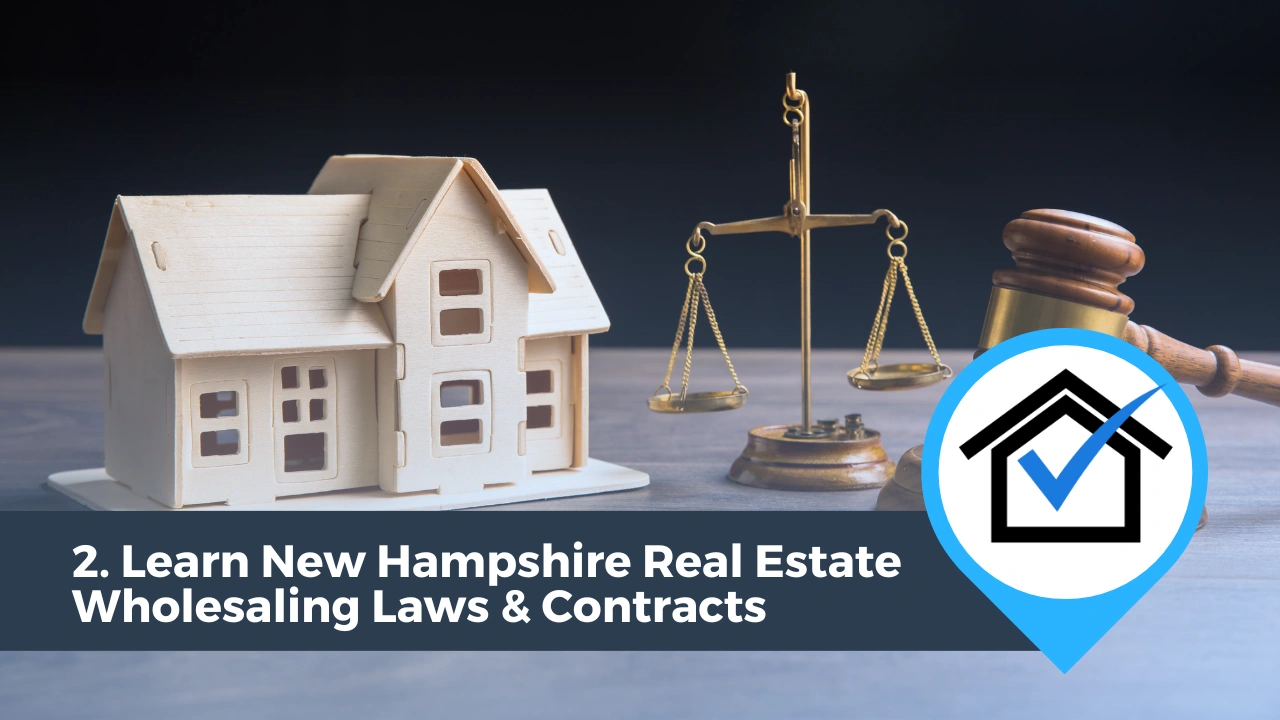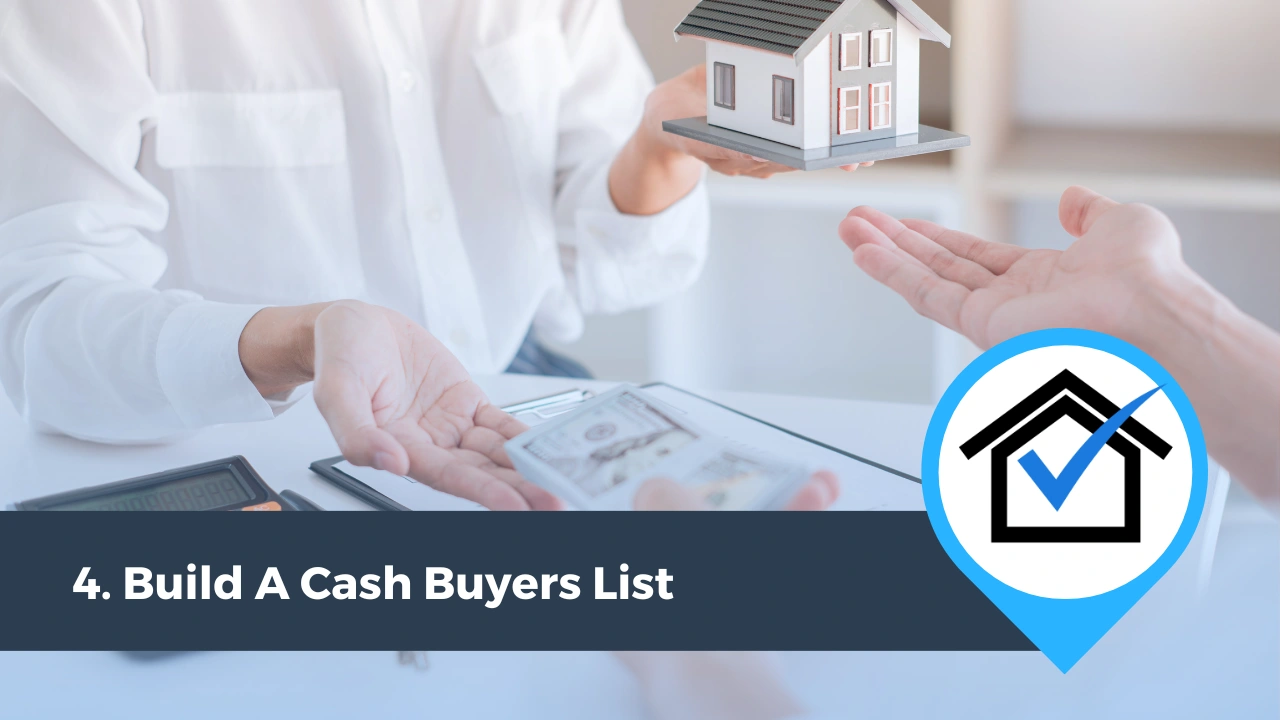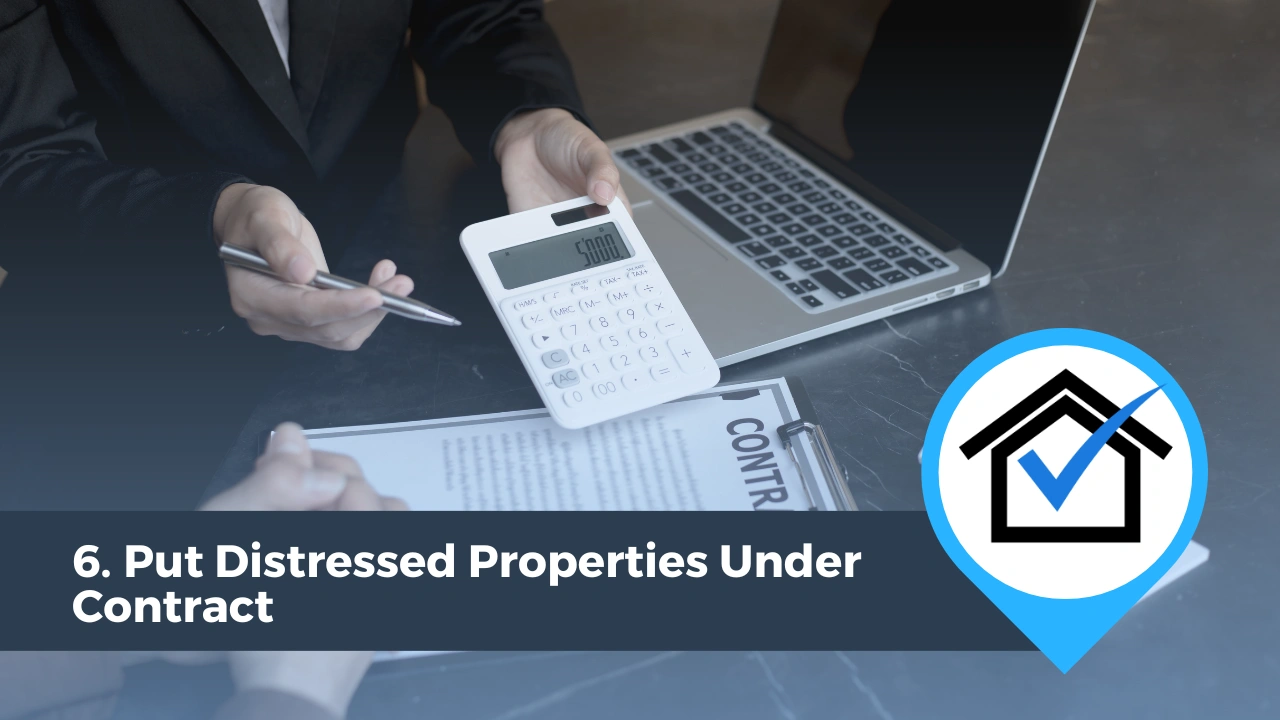How To Wholesale Real Estate In New Hampshire: Step-By-Step (2026)
Feb 26, 2026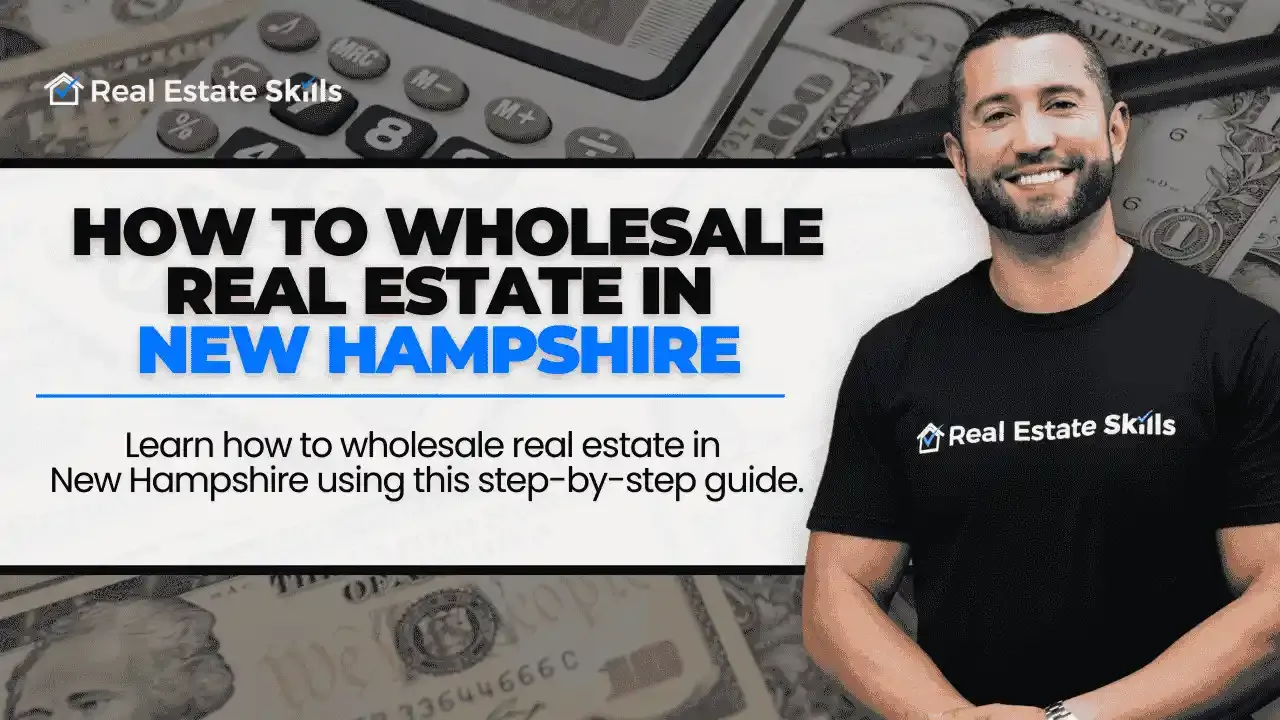
What: Wholesaling real estate in New Hampshire is the process of finding discounted properties, securing them under contract, and assigning those contracts to end buyers—typically cash investors—for a profit.
Why: It’s an appealing entry point into real estate investing because it requires minimal upfront capital or risk. With strong demand for affordable housing and active investor markets in New Hampshire, wholesaling can be a profitable strategy when done correctly.
How: Follow the steps outlined in this guide—research state wholesaling laws, build a buyers list, find motivated sellers, analyze deals, use assignment or double close strategies, and comply with licensing rules—to wholesale real estate legally and successfully in New Hampshire.
Wholesaling is a popular real estate investment technique that allows practitioners from all walks of life to earn substantial fees without risking their own money or credit. With a population of over 1.3 million and more than 634,000 housing units, New Hampshire is the perfect place to learn how to wholesale.
Real estate investing is one of the most reliable methods for creating wealth, and wholesaling is a technique that allows virtually anyone to profit, regardless of your background or financial situation. Although it does not require formal education, you must learn a few basic concepts and techniques before jumping in. So to help you get started, here's a step-by-step guide on how to wholesale real estate in New Hampshire.
- What Is Wholesaling Real Estate?
- How To Wholesale Real Estate In New Hampshire (9 Steps)
- Is Wholesaling Real Estate Legal In New Hampshire?
- How Much Do Real Estate Wholesalers Make In New Hampshire?
- Do You Need A New Hampshire Real Estate License To Wholesale?
- Is Wholesaling In New Hampshire Easy?
- Final Thoughts On Wholesaling In New Hampshire
If you’re serious about doing your first real estate deal, don’t waste time guessing what works. Our FREE Training walks you through how to consistently find deals, flip houses, and build passive income—without expensive marketing or trial and error.
This FREE Training gives you the same system our students use to start fast and scale smart. Watch it today—so you can stop wondering and start closing.
*Before we begin our guide on how to wholesale real estate in New Hampshire, we invite you to view our video on How To Wholesale Real Estate Step by Step (IN 21 DAYS OR LESS)!
Host and CEO of Real Estate Skills, Alex Martinez, provides a comprehensive, step-by-step guide for beginners to start wholesaling real estate!
What Is Wholesaling Real Estate?
Wholesaling real estate is a real estate investing technique that involves scouting properties on behalf of another investor. Wholesalers act as a middleman between homeowners and other real estate investors searching for properties. As a wholesaler, you will look for potential deals and then negotiate with the seller to get a discounted price.
The homeowners you'll be working with are known as motivated sellers, which means they are looking to sell quickly because they are in foreclosure or going through a major change in their lives. You'll negotiate with the seller to get a discounted price on the property in exchange for the fast close and have them sign a contract.
You will then flip that contract to another real estate investor at a markup and collect the difference as an assignment fee. If done correctly, you can easily earn a four to five-figure check without ever purchasing the property.
Read Also: How To Flip Houses In New Hampshire
Why Wholesale Real Estate In New Hampshire?
How To Wholesale Real Estate In New Hampshire (9 Steps)
Let’s dive in, be sure to check out our in depth video showing you how to wholesale real estate step by step here:
With that in mind, here's our simple step by step process for wholesaling real estate in New Hampshire:
- Partner With A Wholesale Mentor
- Learn New Hampshire Real Estate Wholesaling Laws & Contracts
- Understand The New Hampshire Real Estate Market & Lingo
- Build A Cash Buyers List
- Find Motivated Sellers & Distressed Properties
- Put Distressed Properties Under Contract
- Assign The Contract To Cash Buyer
- Close Deal And Collect Assignment Fee
- Double Close Or Wholetail When Necessary

1. Partner With A Wholesale Mentor
Although not necessarily required, partnering with a wholesale mentor is often the best way to learn the ropes. The real estate business takes time to master, and a mentor can help you in many ways by introducing you to people in their network and showing you how to avoid common mistakes. You can find wholesale mentors in many different places, such as real estate networking events and conferences, through partnership programs, or in your own professional network.
You'd be surprised by how many people are willing to help you succeed if you're willing to be patient and listen to their advice. While it's certainly possible to be a successful wholesaler without a mentor, finding an experienced ally can save you time and energy and help you close your first deal much faster.
2. Learn New Hampshire Real Estate Wholesaling Laws & Contracts
Before you begin looking for wholesale properties, you'll want to do some preliminary research and familiarize yourself with the necessary laws and contracts. Wholesaling real estate is legal in New Hampshire. However, you must understand the required process and what is and isn't allowed. One of the biggest things to avoid is engaging in activities requiring licensure. The New Hampshire Real Estate Commission is responsible for governing the practice of real estate in New Hampshire. Title XXX of the New Hampshire Revised Statutes Annotated (RSA), RSA 331a outlines the practices that require licensure and the punishments for breaking the law.
It's also crucial that you familiarize yourself with the necessary contracts, so you're able to close deals without any issues. The two most important contracts to study are the purchase agreement and the assignment of contract. The purchase agreement is the standard contract used to officiate the transfer of a property from a seller to a buyer and outlines the price and legal obligations of both parties.
The assignment of contract is an addition to this contract that allows you to assign your interest in the property to another party - which enables you to wholesale the home for a fee. So, study these two documents closely and reach out to an attorney if you need help.
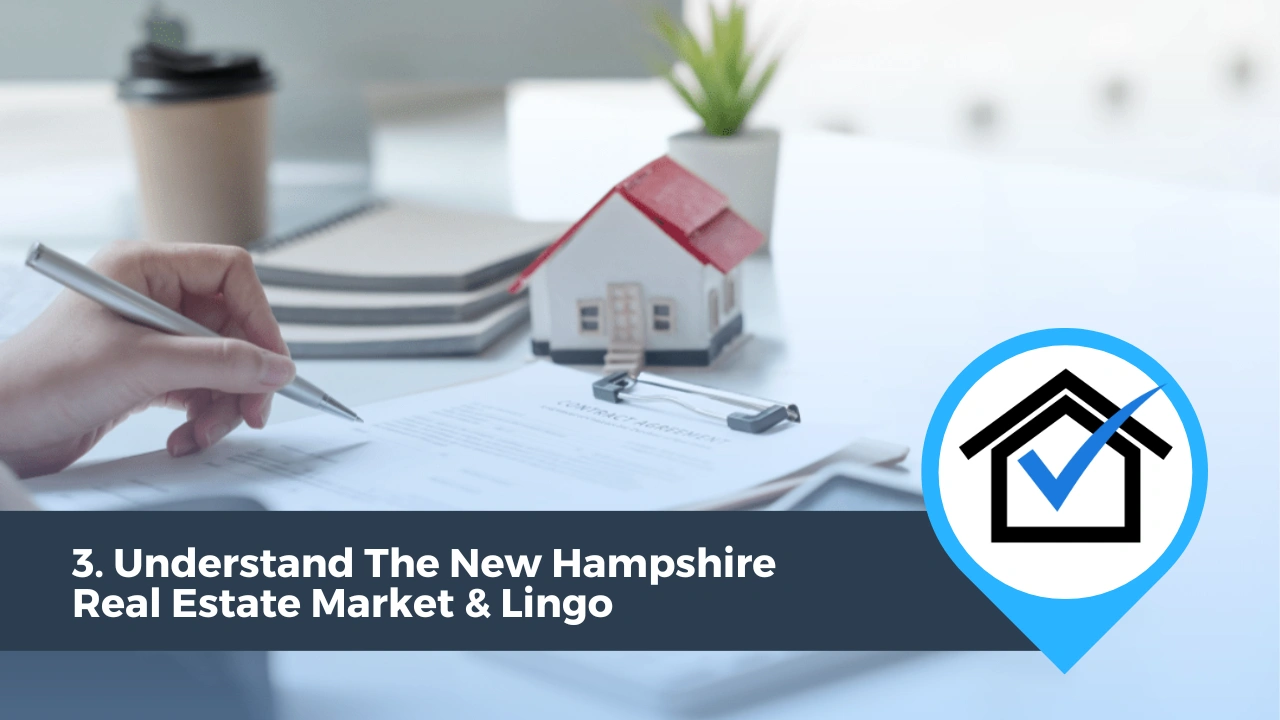
3. Understand The New Hampshire Real Estate Market & Lingo
Beyond studying laws and contracts, you'll also want to familiarize yourself with the local real estate market and master the appropriate terminology. Every real estate market is different and features unique trends that influence the value of the properties in the area. The market in Nashau is much different than in Portsmouth or Concord, so you must familiarize yourself with the trends that impact your area.
Part of your job as a wholesaler is to study the market and determine a fair offer based on the local conditions. So you'll want to study the local price points, demographic trends, school zones, zoning laws, economic projections, and anything else you think may be relevant. The more knowledgeable you are about what drives prices and how to evaluate real estate deals, the more successful you'll be in the long run.
Also, make sure to grasp the terminology used by real estate agents and investors in the area. Familiarize yourself with terms like ARV, MAO, distressed property, motivated seller, off-market, REO, etc. The best way to understand the necessary vocabulary is to attend local real estate events and learn from experienced investors and real estate professionals. An excellent place to start is the National Association of Realtors (NAR), which hosts regular events for professionals in the real estate industry.
Popular NAR Chapters Based in New Hampshire include:
- The New Hampshire Association of Realtors
- Capital Region Board of REALTORS (CRBR)
- Contoocook Valley Board of REALTORS® (CVBR)
- Granite State South Board of REALTORS® (GSSBR)
- Greater Claremont Board of REALTORS® (GCBOR)
- Greater Manchester Nashua Board of REALTORS® (GMNBR)
- Lakes Region Board of REALTORS® (LRBOR)
- Monadnock Region Board of REALTORS® (MRBR)
- North Country Board of REALTORS® (NCBR)
Read Also: How To Wholesale With A Realtor: The (ULTIMATE) Guide
4. Build A Cash Buyers List
Once you've done your homework and understand the local laws, market trends, and terminology, you're ready to get started. However, before you begin wholesaling houses, you'll want to compile a cash buyers list. One of the trickiest aspects of wholesaling is finding a buyer once you have a property under contract.
The sellers you'll be working with will be looking for a fast close and you likely won't have time to start from scratch once the property is under contract. So, before you begin looking for properties, you'll want to network with house flippers and investors searching for an off-market rental property who have the cash ready to spend.
You can also check out this video on how to find cash buyers!
You can find cash buyers by attending local real estate networking events, contacting them through social media, calling the number posted on bandit signs, or any other method that works for you. When you find potential buyers, get some basic information to keep on file.
Info to obtain from cash buyers includes:
- Contact information (name, email address, phone number, etc.)
- Budget
- What type of property are they looking to buy (single-family, multi-family, commercial?)
- How soon are they looking to make a purchase?
- How are they financing the deal? (cash, hard money, etc.)
- What markets are they interested in?
Feel free to add to this list to suit your preferences. Keep the information safe in a spreadsheet or CRM so you can access it when it comes. Remember that you don't necessarily have to stay in New Hampshire.
You can also wholesale in Maine, New Jersey, New York, Massachusetts, Connecticut, Rhode Island, Vermont, Maryland, or even South Carolina. As long as you have a solid understanding of the local market, you can target any area that's popular with investors.

5. Find Motivated Sellers & Distressed Properties
You're ready to go out and start scouting properties when you've developed a solid cash buyers list. To make money as a wholesaler, you'll need to find properties you can purchase at a significant discount. The average homeowner who can list their property for market value likely won't be interested in selling at a price low enough to make a solid wholesale deal.
So you'll need to find homeowners who need to move quickly and don't care about getting the highest price for their property. Most of the time, this is because they are in foreclosure and want to avoid damaging their credit.
Dive into real estate wholesaling with confidence. Download our FREE Wholesaling Cold Calling Script!
You can use several different methods to find motivated sellers and distressed properties. A few common techniques include:
- Driving for dollars
- Sending direct mail advertisements
- Posting bandit signs
- Posting ads on Craigslist or Facebook
- Attending property auctions
- Checking public records for foreclosures, bankruptcies, tax liens, etc.
You may use all of these methods or just a few, but marketing is a major aspect of the wholesaling business, so take the time to find a strategy that makes sense.
Read Also: Finding Motivated Seller Leads: Free & Paid Tactics
6. Put Distressed Properties Under Contract
It may take some time, but if you plant enough seeds, you'll eventually get a response. However, the next step is often the most difficult: negotiating a price. Before you begin the negotiation process, it helps to familiarize yourself with a few key formulas - After Repair Value (ARV) and Maximum Allowable Offer (MAO).
The ARV refers to the amount the home will likely get on the open market when renovated to market standards. Investors use the ARV to evaluate the potential of a deal, so you'll want to learn how to calculate it to determine your offer.
Here are the steps for calculating ARV:
- Find 3-5 similar properties in the area that sold recently (also known as real estate comps)
- Look up the sales price and square footage of each property
- Divide the sales price by the square footage to determine the price per square foot
- Find the average of the price per square foot of all the comps
- Multiply the average by the square footage of the property you want to wholesale
This will give you a rough estimate of the price the home could likely get when renovated to meet standard market conditions.
Once you've determined the ARV, you can use that to calculate the MAO or the highest price you can offer and still turn a profit.
Before you determine your MAO, let's look at how to lock in that property.
Watch this video to learn how to confidently fill out real estate contracts and secure your deal.
The MAO formula is MAO = ARV - fixed costs - rehab costs - preferred profit
Fixed costs are expenses like taxes, insurance, loan interest, utilities, and anything else related to owning the property while it's being rehabbed. Rehab costs refer to the expenses related to improving the property's condition, such as construction, labor, materials, fixtures, etc. The preferred profit refers to the amount of money the investor would like to make on the deal, in addition to your own fee.
So get a rough estimate of the expenses and profit margins needed to make the deal work and subtract it from the ARV. That will tell you how much you can afford to offer the seller while keeping your price low enough to attract interest from cash home buyers.
Some investors use the 70% rule as a shortcut for calculating the MAO, which says your offer should not exceed more than 70% of the ARV. This can be a good place to start, but may not always suffice. The more accurate you are, the more likely you are to earn a higher fee, so it pays off, in the long run, to be thorough when you crunch the numbers.
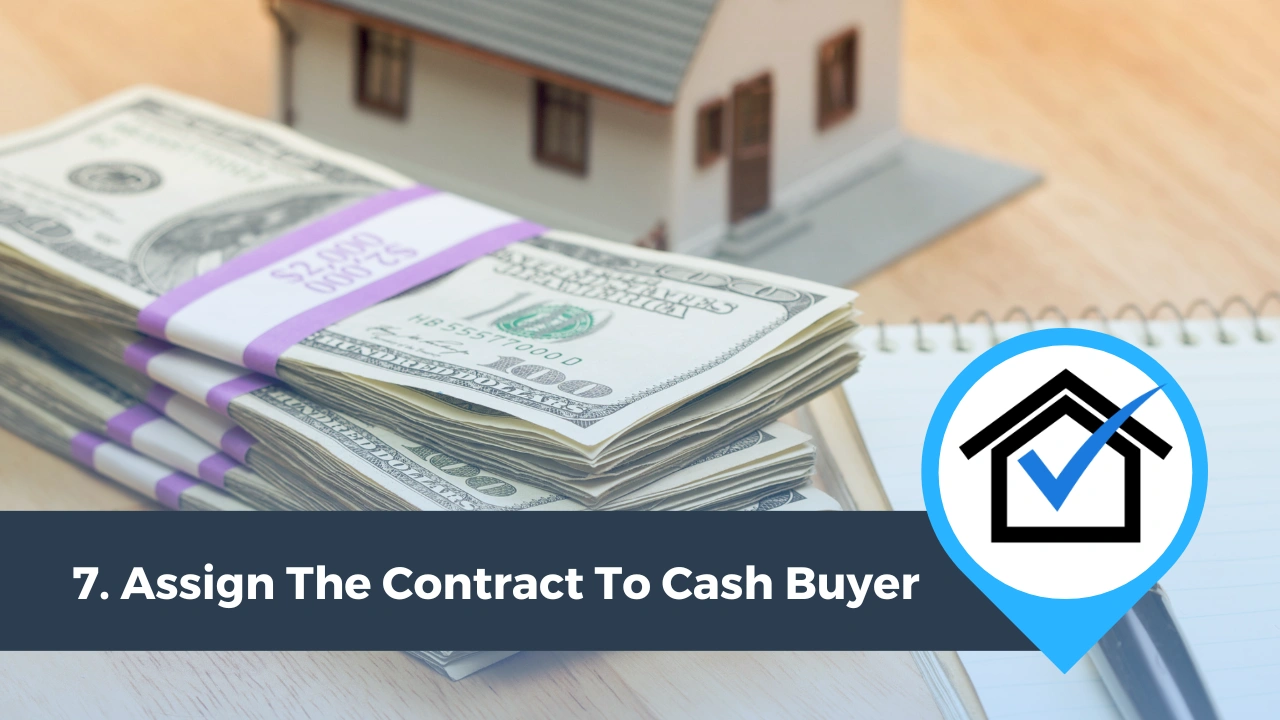
7. Assign The Contract To Cash Buyer
Once you and the seller have agreed on a price and signed a contract, you'll want to begin calling the names you compiled in your cash buyers list.
Call everyone on the list who may be interested in purchasing the type of property you're looking to wholesale until you find someone interested in the deal.
You may even find several interested investors and try to start a bidding war, but, eventually, you'll want to narrow it down to one buyer and have them agree to sign the other half of the contract.
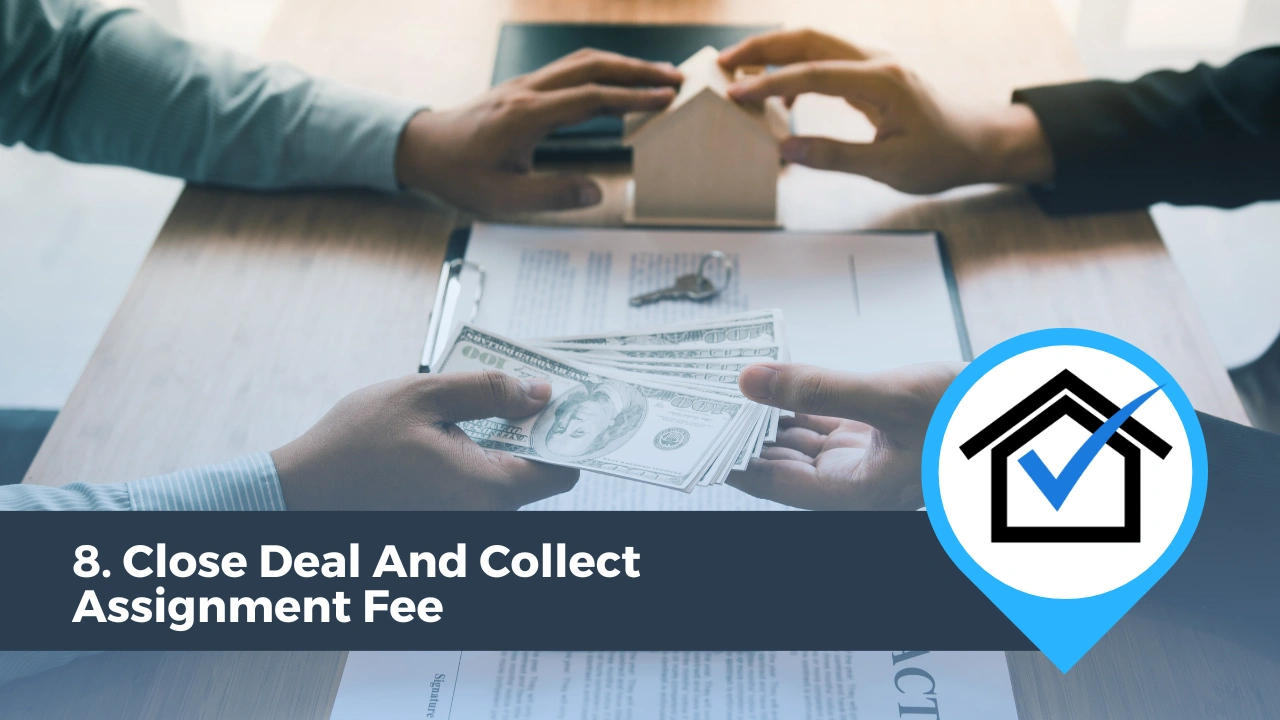
8. Close Deal And Collect Assignment Fee
When you have a seller and a cash buyer lined up, all that's left to do is close the sale and collect your assignment fee. You'll set a date with the buyer and seller to meet with them and/or their legal representation to finalize the contracts and exchange funds. The buyer will be responsible for paying the closing costs and bringing the cash to the table since they're the ones who will be purchasing the property.
All you have to do is coordinate the process and ensure everything goes as smoothly as possible. Once all the paperwork is signed, and the funds have been exchanged, the title company will transfer ownership of the property from the seller to the new buyer. The buyer will then proceed with the renovations, and you will collect your check and move on to the next deal.
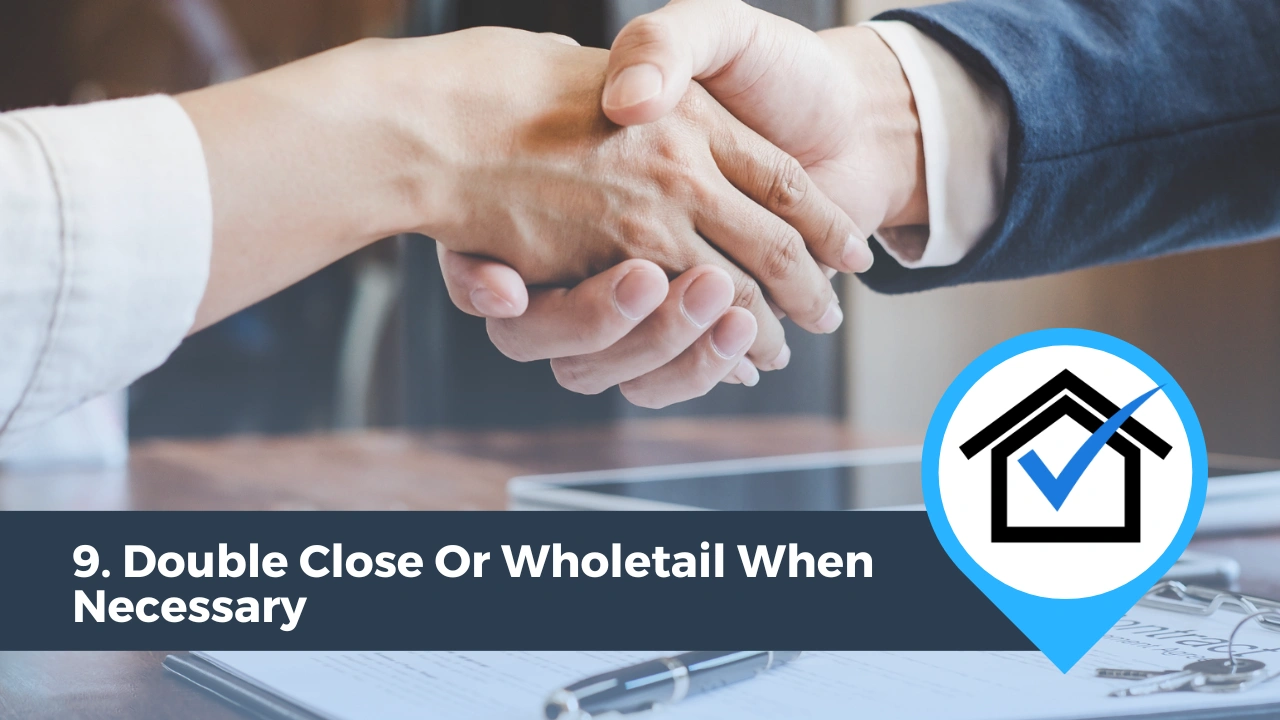
9. Double Close Or Wholetail When Necessary
It's also good to be aware that you may consider a few different exit strategies, such as a double close or a wholetail.
As the name implies, a double close is when you close on the property twice, once with the seller and once with the buyer.
The process is the same as an assignment contract, except you will briefly take ownership of the property and be included in the chain of title. It's a bit more complicated and expensive as there may be twice the closing costs. However, it may be necessary if the buyer is financing the purchase and the lender can't underwrite an assignment contract.
Another popular strategy is wholetailing. Wholetailing is a combination of flipping and wholesaling that involves purchasing the property yourself, then selling it on the open market without making significant renovations.
Wholetailers typically only clean up the property or make small cosmetic renovations, but won't go forward with a full rehab like a house flipper. However, unlike wholesaling, you will need to purchase the property and put up your own money, which means more risk but also higher profit margins.
Is Wholesaling Real Estate Legal In New Hampshire?
Yes, wholesaling is perfectly legal in New Hampshire, but you should be sure to review the local laws carefully to avoid getting into trouble. For instance, New Hampshire is an attorney-closed state, which means a lawyer must be present at the closing to complete the transaction. So, make sure that either the buyer or seller has legal representation (preferably both) before you close on the deal.
It's also crucial to note that, as a wholesaler in New Hampshire, you can only market your interest in a property, not the property itself. It's a subtle distinction but can lead to legal problems if you begin advertising the property without disclosing your interest or involvement in the deal.
How Much Do Real Estate Wholesalers Make In New Hampshire?
Wholesaling offers near-unlimited earning potential, but it all comes down to how much time and effort you put in. The average wholesale assignment fee is $10,000 but it can be more or less depending on the market and your negotiating skills.
At that rate, even a novice wholesaler who only closes a deal every 2 to 3 months can make an extra $50,000 yearly from wholesaling. More experienced wholesalers can earn as much as $240,000 to $600,000 in a year by closing 5 to 10 deals per month. So, as long as you're willing to put in the work, there's no limit to the amount of money you can earn.
Read Also: Wholesale Real Estate Salary | The (ULTIMATE) Guide
Do You Need A New Hampshire Real Estate License To Wholesale?
No, a real estate license isn't needed to wholesale in New Hampshire as long as you avoid brokerage activities in exchange for a commission. Brokerage activities include any services or responsibilities commonly offered by a real estate agency, including marketing the property, fielding offers, giving the seller or buyer advice, hosting open houses, or helping with negotiations.
You can find the complete list of activities that require a New Hampshire real estate license by reviewing Title XXX of the New Hampshire Revised Statutes. If you want to find out the requirements for obtaining a real estate license in New Hampshire, check administrative rules Rea 301.03(o) and (p).
Is Wholesaling In New Hampshire Easy?
No wholesaling is not always easy, but it is a rewarding and lucrative practice for those willing to do the work. It's one of the most reliable ways to earn a significant amount of money in the short term without taking any wild risks.
Although it does take patience and dedication to master, it does get much easier with the help of a coach, mentor, or property training program like the Pro Wholesaler VIP Program that we offer in Real Estate Skills.
The Pro Wholesaler VIP Program is designed for the modern entrepreneur to learn the basics and how to help new real estate wholesalers avoid the pitfalls typically found by beginners. It is 100% online and is used for local and virtual real estate wholesaling.
Final Thoughts On Wholesaling In New Hampshire
Wholesaling is one of the only ways you can make money in real estate without having to own property. It allows even absolute beginners to learn about the business while collecting substantial fees and building a network of other investors.
However, to be successful, you must study the business carefully and master the fundamental concepts before you start searching for properties. Check out our brand new free training on how we help investors all across the country, wholesale and flip houses from the MLS using only a laptop and a cell phone.
If you’re serious about doing your first real estate deal, don’t waste time guessing what works. Our FREE Training walks you through how to consistently find deals, flip houses, and build passive income—without expensive marketing or trial and error.
This FREE Training gives you the same system our students use to start fast and scale smart. Watch it today—so you can stop wondering and start closing.
*Disclosure: Real Estate Skills is not a law firm, and the information contained here does not constitute legal advice. You should consult with an attorney before making any legal conclusions. The information presented here is educational in nature. All investments involve risks, and the past performance of an investment, industry, sector, and/or market does not guarantee future returns or results. Investors are responsible for any investment decision they make. Such decisions should be based on an evaluation of their financial situation, investment objectives, risk tolerance, and liquidity needs.

